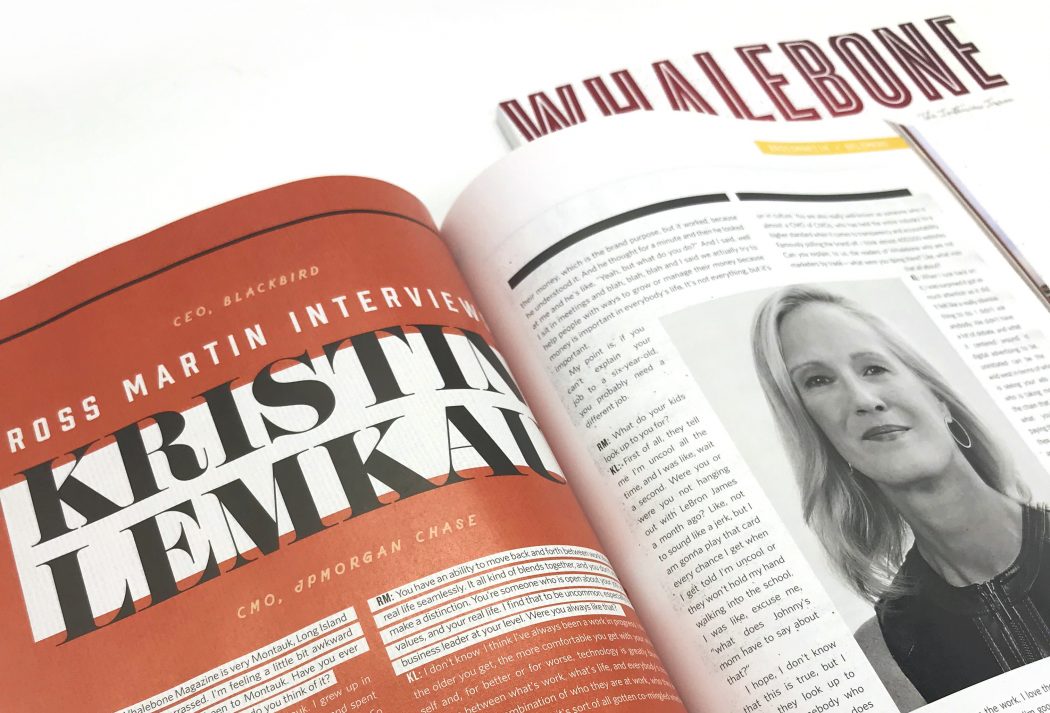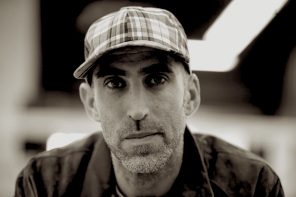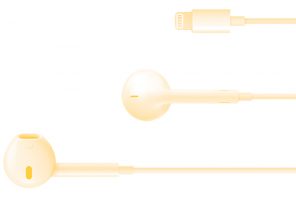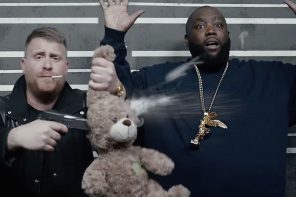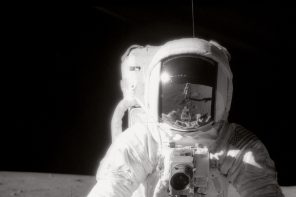A CMO’s Work Is Never Done
We asked 30 people who we admire to each interview one person they admire. That’s the concept behind the Interview Issue presented by Design Within Reach.
Ross Martin is an Emmy and Peabody Award-winning marketer and CEO of Blackbird. Kristen Lemkau is the CMO of JPMorgan Chase. Naturally, they talked about the beach and how taking them to hang out with Lebron James should at the very least make your kids stop telling you that you’re not cool.
It should, right? At the very least.
Ross Martin: Whalebone Magazine is very Montauk, Long Island, and I’m a little bit embarrassed. I’m feeling a little bit awkward about the fact that I’ve never been to Montauk, Long Island. Have you ever been?
Kristin Lemkau: Of course I’ve been to Montauk, Long Island. I grew up in New England, as you may know. I grew up in Boston and I went and spent most summers in Cape Cod or Massachusetts my whole life. So when I moved to New York and I was single and going out to the Hamptons every weekend like everybody else, looking for love, Montauk and Amagansett were my two favorite places because they reminded me of New England. I actually celebrated my 40th birthday in Montauk with my husband.
RM: Oh, nice. So how would you describe what you love about Montauk?
KL: When I first got out to the Hamptons … I probably shouldn’t say this, but, it felt … pretentious isn’t the wrong word, but it felt like everybody was trying too hard.
And then the further east that you got, the less and less that was true. And when I got to Montauk, and I’d say the same is true of Amagansett, I felt completely comfortable. I don’t want to wear make-up on the weekends and get dressed up. I want to feel like I’m at the beach, and all of the serenity that comes along with the beach. So I loved it and I totally get it. I also liked the mix of people there. You get some of the captains of industry that you’d expect out there, but you’d also get surfers and college kids and just people who have probably very different lifestyles that are connected to the serenity of the place.
RM: You have an ability to move back and forth between work life and real life seamlessly. It all kind of blends together, and you don’t really make a distinction. You’re someone who is open about your job, your values, and your real life. I find that to be uncommon, especially for a business leader at your level. Were you always like that?
KL: I don’t know. I think I’ve always been a work in progress. I think the older you get the more comfortable you get with your whole self and for better or for worse, technology is greatly blurring the line between what’s work, what’s life, and everybody’s social profiles are a combination of who they are at work, who they are in their personal life … so it’s sort of all gotten co-mingled whether you want to or not.
The only thing I’d add to that is, I think when you’re at work, you are a far more effective leader if you bring your whole life and your whole self to work because, I found when somebody seems to be going off the rails at work, sometimes it’s just they’re over their job or they’re not the right person and all that. But more often than not, something’s going on in their life. And if people feel like they can’t bring that, you’re not gonna get the best out of people.
RM: What do your kids say when asked what their mother does?
KL: That’s a funny question. So my son asked me, maybe about a year or two ago … and he’s like “what do you do?” And this sounds cheesy, but it was a really profound moment where, how would I describe this to a 6 year old, right?
So I sort of came back to “we try to help people make the most of their money,” which is the brand purpose, but it worked, right, because he understood it. And he thought for a minute and then he looked at me and he’s like, “Yeah, but what do you do?” And I said, “well I sit in meetings and blah, blah, blah” and I said, “we actually try to help people with ways to grow or manage their money because money is important in everybody’s life. It’s not everything, but it’s important.”
My point is, if you can’t explain your job to a six year old you probably need a different job.
What does Johnny’s mom have to say about that?
RM: What do your kids look up to you for?
KL: First of all, they tell me I’m uncool all the time, and I was like, wait a second. Were you or were you not hanging out with LeBron James a month ago? Like, not to sound like a jerk, but I am gonna play that card every chance I get when I get told I’m uncool or they won’t hold my hand walking into the school. I was like, excuse me, “What does Johnny’s mom have to say about that?”
I hope—I don’t know that this is true—but I hope they look up to me as somebody who works hard that does something I love and something I believe in. This isn’t a paycheck for me. I actually love the work. I love the product. I love the company. Hopefully, they know I’m good at admitting my flaws.
Where is the Love? I wish everyone could have heard @iamwill at #equalitylounge #wef18 tonight. #truth “We all came from women. Now that’s power.” pic.twitter.com/upmvejnCtq
— Kristin Lemkau (@KLemkau) January 23, 2018
RM: You’re known for a bunch of things as the Chief Marketing Officer at Chase. One of them is how successfully you have guided the Chase brand over the years in the midst of massive transition in the financial services business and obviously everything that’s going on in culture.
You are also really well known as someone who is almost a CMO of CMOs, who has held the entire industry to a higher standard when it comes to transparency and accountability—famously pulling the brand off of, I think almost 400,000 websites. Can you explain to us, for readers of Whalebone who may not be marketers by trade, what were you doing there? Like, what was that all about?
KL: When I look back on it, I was surprised it got as much attention as it did. It felt like a really obvious thing to do. I didn’t ask anybody. We didn’t have a lot of debate, and what it centered around is digital advertising to the uninitiated can be the Wild West in terms of who is seeing your ads and who is taking money in the chain that intercepts what you’re actually paying the publisher. And then you get people who are creating robots to see your ads instead of human beings.
There is a responsibility of people who know how to shape a narrative and tell a story to focus that energy on something other than selling stuff.
But the wake-up call for me was when a New York Times reporter had found one of our ads on a fake news site. This was about the same time that some other brands, luckily not us, had found their videos on ISIS recruiting sites, and what it exposed is a mass amount of laziness, frankly, in those marketers and platforms, and probably publishers in who was seeing the ads. So when I actually asked the question, how many websites were our ads on, and got the answer 400,000 I almost threw up.
And there’s been a fair amount of wonky debate of “can a machine do that?” and you know, “can algorithms blah, blah” … you know in the end, your brand is your asset and it means something to customers and you can’t have it being polluted by things that you don’t think are right for your brand. Another brand might draw that line a little differently. We drew it very high, and we said well this is something that we have to do ourselves. This isn’t just about advertising. The money I’m spending came from somewhere … you know customers’ money. This is money that ultimately gets returned to shareholders. Like the high responsibility not only of keeping that chain clean but what it’s gonna support.
RM: In holding the industry to a higher standard, to me, you changed the conversation for marketers from one that was about value to one that was about values.
KL: Correct.
Stay In Your Lane
RM: Let’s talk about values a little bit more and about what you stand for. Can you talk about your commitment to the issue of gun safety and gun awareness, why that matters to you and what you’re doing about it?
KL: I could probably take up this entire issue with that question, but for me it’s an issue that the more you learn about it, the more enraged you become. Whether it’s the fact that there are 33,000 gun deaths every year or the fact that the United States has the loosest gun laws in the world, or the thing I think that drove me the craziest about it is that it’s an issue that’s built on a lie. And the lie is that a gun in the home makes it safer.
Now law abiding people can choose to have a gun in their homes, and they have every right to do that, provided they follow the law, but they should know the facts. And the facts that people are dying over a lie, I suddenly realized that this is something that I could do something about.
The thing I think that drove me the craziest about it is that it’s an issue that’s built on a lie.
I’ve always been clear that this is my issue. This isn’t the company’s issue. This is something that I feel passionately about, but when people come to me, and a lot of people do and say this is making me crazy, what can I do? I say, can you lend your brain to how we think about getting the facts out about this in the same way people did about drunk driving, about gay marriage, about smoking, about seat belts, about all of these issues that were once about personal choice or you know some other fallacy but soon became about the importance of public safety.
I think at a time where truth is more in question than ever, there is a responsibility of people who know how to shape a narrative and tell a story to focus that energy on something other than selling stuff.
RM: Has anyone ever told you to stay in your lane?
KL: Sure. Of course.
I think it’s, “define lane.” Like what does it mean to be in my lane?
I’ve got a skill that I can apply outside the company that’s unrelated to the company. We’ve got a set of values that we stand for, and I think when you’re the marketer, you’re not just the person who’s in charge of revenue. Although that’s really important, you’re actually in charge of the brand and protecting the brand. I think when personal and professional and a lot of these things start to blur, it’s not really clear what anyone’s lane is anymore.
Your lane is wide.
This is a very, very different example, and I would never compare myself to him but, a lot of people told LeBron James to go back in his lane. Is he a basketball player or is he somebody of influence?
I’ve got a little voice. I don’t have a big voice. I’ve got a little voice and you want it to be used for good.
RM: It’s very clear you’re coming back as an athlete in your next life. Are you playing basketball, are you playing baseball, what’s the sport you’re playing?
KL: Oh man, that’s like which of your children do you love more. I wouldn’t even know. I tell you, I wouldn’t pick the sport so much as I would pick the athlete and of the athletes I admire, they are from different sports.
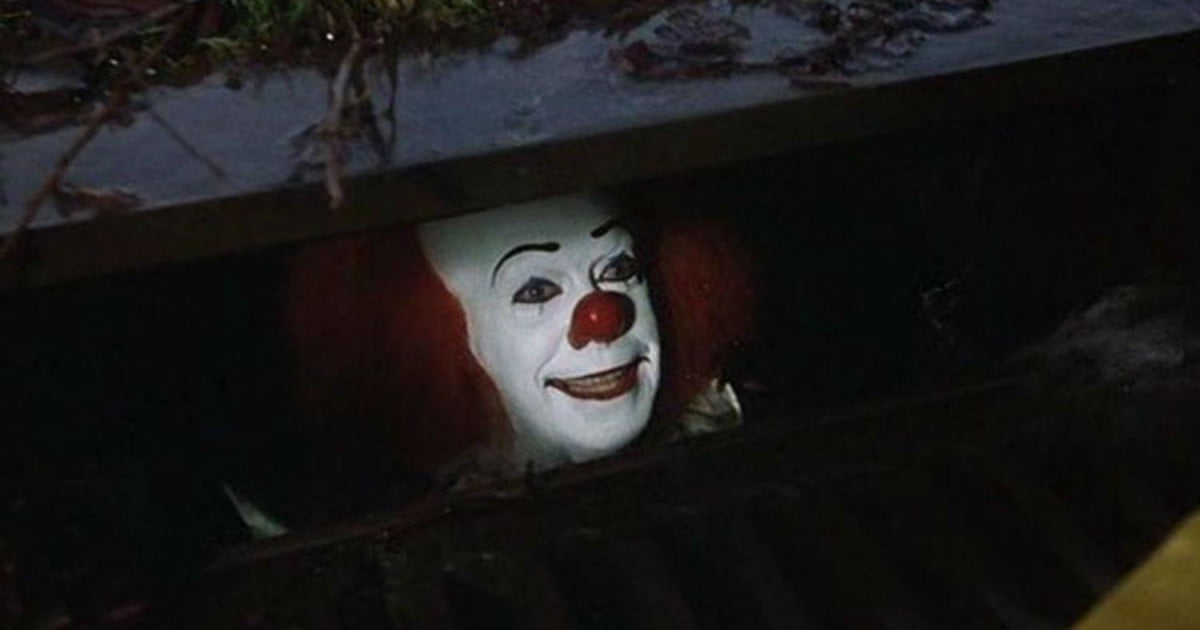
Lightning Round
RM: What are you scared of?
KL: Something happening to my kids, clowns, creepy puppets.
RM: Entering our speed round and I’m gonna ask you for quick answers to these questions. Flip flops, sandals or Crocs?
KL: Flip flops. I’m wearing them right now.
RM: When you get your own show, what will it be called?
KL: KristIn Interviews Athlete of the Month.
RM: The title of the book that I’m making you write?
KL: “How Not to Have it All” but I’d probably change the title of the book.
RM: The weirdest thing anybody’s ever been caught doing on camera at an ATM machine?
KL: The key answer is robbing it, because that’s what we watch. We don’t sort of watch in sort of voyeuristically to see people’s weird shit.
RM: First job?
KL: Selling toilet seats at the Short Hills Mall … luxury toilet seats. You can’t return them.
RM: Where do you get your strength from?
KL: Ariana Huffington wants me to say sleep, but the answer is knowing I’m somebody outside of work.
RM: Life achievement you’re most proud of?
KL: Deciding I was going to become my father.
RM: Wow.
KL: After my father died.
RM: Career achievement you’re most proud of?
KL: Building a great team. Something that’s going to live on beyond me.
RM: Time you go to bed at night?
KL: Time I go to bed at night? I will lie and say 9:30, but it’s more like 10:30.
RM: Last thing you do before you go to bed? And don’t say your husband.
KL: Check my phone.
RM: Time you wake up in the morning?
KL: It’s 5:20 am.
RM: First thing you do when you wake up?
KL: Check my phone.
RM: Oh my God. Ariana’s gonna kill you. She’s gonna kill you.
KL: Totally caught.
RM: Training regimen?
KL: Oh, you mean workout? Following around an eight-year-old boy.
RM: Favorite cocktail?
KL: Dark and stormy.
RM: Do you make your bed in the morning or leave it as it was?
KL: Never make my bed.
RM: Describe your belief system.
KL: Oh, man. This is the lightning round? This is hard.
RM: This one’s not lightning round, but I do want it to be succinct. That’s why I left it after the lightning round.
KL: The short answer is do the right thing. The longer answer is, if you’ve ever sat through your parents funeral and you listened to what people say about them, it totally resets how you choose to live your life and what you want to be known for. It’s easy to sort of say that in the abstract, you know, the seven habits things of write your eulogy. It’s actually very, very different when you have to deliver one. I think it makes you feel very intentional about what you want to be known for.
RM: I agree. And last question is, advice to a young Kristin.
KL: Relax. Enjoy it all a bit more. No need to keep waiting for the next thing to happen without appreciating the thing that you’re in.

